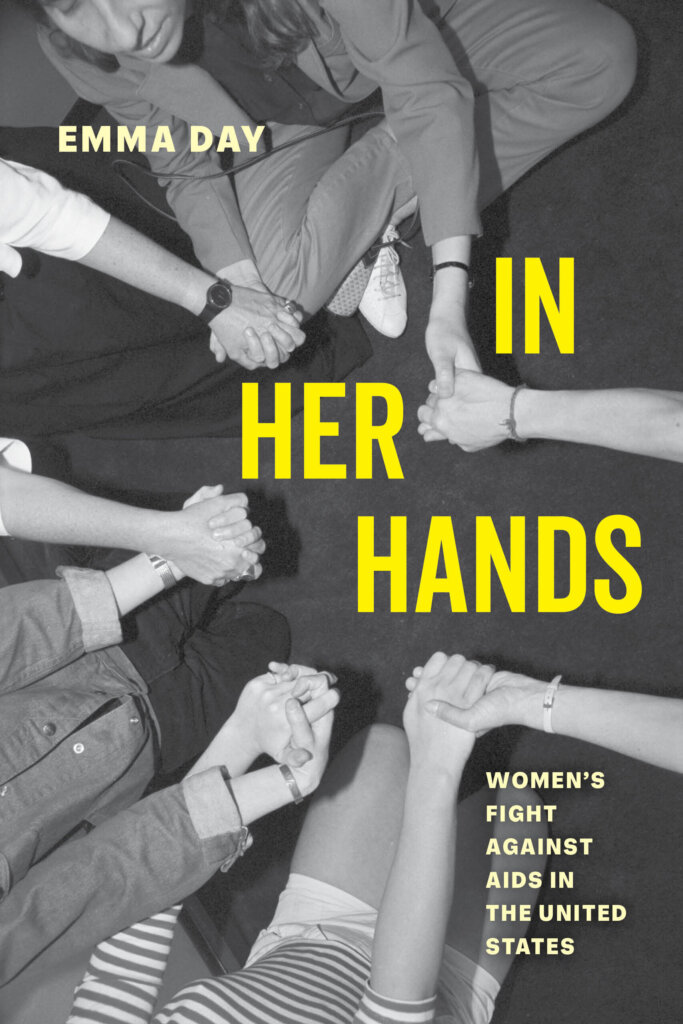
The new book In Her Hands: Women’s Fight against AIDS in the United States examines the various strategies women have utilized to fight for recognition as individuals vulnerable to and living with HIV/AIDS across multiple settings since the 1980s. Taking a new chronological and thematic approach to the study of the US epidemic, it explores five arenas of women’s AIDS activism: transmission and recognition, reproductive justice, safer sex campaigns for queer women, the carceral state, and HIV prevention and treatment.
Author and FirstGen scholar Emma Day tells us about her academic journey, what led her to writing this crucial and timely book, and what advice she has for fellow first-generation scholars.
Tell us about your journey to your current position as a Research Fellow at the Rothermere American Institute at the University of Oxford. What motivated you to become an academic, and to focus on history with a focus on histories of gender, sexuality, and activism?
I completed my master’s and doctoral degrees in US History at the University of Oxford and was fortunate to be able to stay on at Oxford’s Rothermere American Institute (RAI) as a postdoctoral research fellow to revise my PhD into a book monograph and teach. Studying History at University exposed me to the power of History to shape the present, giving us the tools to question and challenge what we take for granted as fixed and normal, and to craft new narratives that can shape social change.
I became interested in the role and representation of women in history at school, informed in part by their relative absence in the curriculum. When my undergraduate degree at UCL in London introduced me to the ways in which ideas about men and women in different historical contexts were socially constructed, it ignited a drive to explore further where the assumptions and expectations we have about gender roles and sexual norms come from and how ordinary people have challenged, subverted, and shaped these. When I left UCL for Oxford, activist history became a key vehicle for exploring these dynamics further. In particular, the methods and approaches of activist history appealed to my interest in how people’s subjective experiences and the function of political, medical, and other institutions interact over time to shape identities and experiences – something I explore in the context of the AIDS epidemic in In Her Hands. Ultimately, my motivation to become an academic came from a love of research and teaching, and a belief that through these activities academics can contribute to widening equality and securing social justice.
What was the process like to publish your book, In Her Hands? What helped you the most along the way?
Publishing In Her Hands was an exciting and—as a first-time author—a sometimes daunting experience. Revising my doctoral thesis into a book monograph, I enjoyed having greater freedom to experiment with my writing style and develop an authorial voice. Nevertheless, the task of revising my doctoral thesis, and tailoring it for publication as a monograph, at times felt overwhelming. My PhD supervisors, Mara Keire and Stephen Tuck, helped enormously to demystify this process, including by offering advice on how to pitch my doctoral project as a book project in my book proposal. I also benefitted from the professional guidance of other academics at the RAI. During my PhD, the RAI held regular seminars on such topics as writing book proposals in which more senior colleagues shared proposals and spoke to their experiences. These examples became incredibly useful reference points when I came to write my own.
I was also extremely lucky to work with generous and supportive editors at University of California Press, specifically Niels Hooper, Naja Pulliam Collins, and Jeff Anderson, who provided support and reassurance throughout. Niels and Naja explained the publication process once I received my book contract, outlining next steps, upcoming deadlines, and answering any questions I had. The detailed reports I received from my peer reviewers also helped structure my revisions. Jeff helped see me over the finishing line as the manuscript went into production. He provided clear instructions and guidance about the final stages of the process, including copyediting, and hiring an indexer. Overall, the continued support of my academic mentors and the editorial team at UC Press helped me address the uncertainties and anxieties I had around revising my doctoral thesis for publication as a monograph.
Having gone through the process yourself, what advice do you have for other first-generation scholars who may still be starting out?
My main advice to other first-generation authors is to use your network of peers, colleagues, and mentors to get advice, guidance, and feedback on as many elements of your book project as you can—be it your book proposal, identifying a suitable series and publisher for your monograph, going through the peer-review reports, or sharing final drafts—to support you on what might be a new and unfamiliar journey. Drawing on my network not only helped me to overcome the isolation that often accompanies academic work but also made that work better. The editors at UC Press were fantastic to work with, and I would reiterate the importance of asking your editorial team if you have questions about any stage of the publication process.
What does supporting first-gen scholars mean to you?
Supporting first-gen scholars means dismantling the many barriers—including financial, institutional, and informational—that exist within higher education. Removing these barriers helps to ensure that scholarship reflects a diversity of voices and perspectives which not only benefits our own academic fields but society more broadly.
